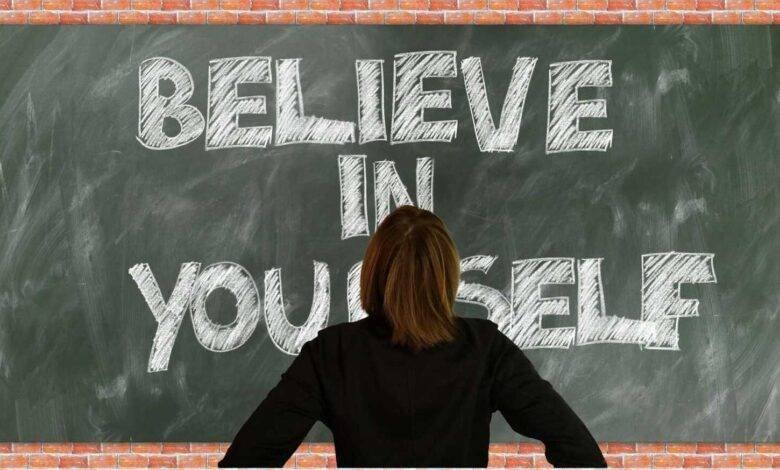Confidence Gap: 7 Proven Strategies to Crush

Ever feel that invisible barrier holding you back? That voice whispering “you’re not good enough” or “maybe this isn’t for you”? We’ve all been there, sister. That, my friend, is the confidence gap, a sneaky foe that can trip us up just when we’re ready to soar. But guess what? You don’t have to be its captive. This blog is your confidence toolkit, packed with empowering strategies, real-life stories, and actionable tips to shatter the gap and unleash your inner rockstar. So, grab your coffee (or tea!), settle in, and get ready to conquer 7 proven strategies to crush your confidence gap!
Table of Contents
Overcoming Imposter Syndrome as a Woman
Imposter syndrome, characterized by feelings of self-doubt and inadequacy despite evident success, disproportionately affects women in various fields. Overcoming imposter syndrome involves recognizing and challenging these negative thoughts and beliefs, embracing one’s accomplishments, and seeking support and mentorship.
Examples:
- Maya Angelou: Despite her numerous accolades as a writer and activist, Maya Angelou famously struggled with imposter syndrome throughout her life. She overcame this by acknowledging her achievements and understanding that self-doubt is a common experience shared by many successful individuals.
- Sheryl Sandberg: Facebook COO Sheryl Sandberg openly discussed her battle with imposter syndrome, emphasizing the importance of acknowledging one’s accomplishments and seeking support from mentors and peers to combat feelings of self-doubt.
Websites and Resources:
- Lean In: Offers articles and resources on overcoming imposter syndrome and building confidence in the workplace (https://leanin.org/).
- “The Confidence Code” by Katty Kay and Claire Shipman: Explores the phenomenon of imposter syndrome and offers strategies for overcoming self-doubt and building confidence
- Psychology Today: Provides articles and tools for understanding and overcoming imposter syndrome, offering practical tips and exercises for building self-confidence (https://www.psychologytoday.com/).
Building Confidence for Career Advancement
Confidence is a key factor in career advancement, enabling women to pursue opportunities, take on leadership roles, and advocate for themselves effectively. Building confidence involves recognizing one’s strengths, setting ambitious goals, and pushing past fear and self-doubt.
Examples:
- Indra Nooyi: Former CEO of PepsiCo, Indra Nooyi, attributed much of her success to her unwavering self-confidence and belief in her abilities. She encouraged women to trust in themselves and their capabilities, regardless of external challenges.
- Melinda Gates: Philanthropist and co-founder of the Bill & Melinda Gates Foundation, Melinda Gates, emphasizes the importance of confidence in driving social change and empowering women globally.
Websites and Resources:
- The Confidence Gap by Russ Harris: Offers evidence-based strategies for building confidence and overcoming self-doubt, empowering women to pursue their professional goals with conviction.
- TED Talks Women: Features inspiring talks by women who have achieved career success through confidence and resilience, offering insights and inspiration for aspiring leaders (https://www.ted.com/playlists/486/ted_talks_by_strong_women_lead).
- The Muse: Provides articles and resources on building confidence and advancing in one’s career, offering practical tips and strategies for overcoming obstacles and achieving success (https://www.themuse.com/).
Public Speaking Tips for Women with Anxiety
Public speaking can be a daunting experience, especially for women who may experience heightened anxiety and self-doubt in professional settings. Overcoming public speaking anxiety involves practicing self-care, preparing thoroughly, and focusing on the message rather than perfection.
Examples:
- Michelle Obama: Former First Lady Michelle Obama overcame public speaking anxiety through preparation and practice, emphasizing authenticity and connecting with her audience on a personal level.
- Brené Brown: Researcher and author Brené Brown acknowledges her struggles with public speaking anxiety and emphasizes the importance of vulnerability and authenticity in connecting with audiences.
Websites and Resources:
- Toastmasters International: Offers public speaking clubs and resources for women to practice and improve their speaking skills in a supportive environment (https://www.toastmasters.org/).
- The National Institute of Mental Health: Provides resources and tips for managing anxiety and stress, offering evidence-based strategies for coping with public speaking anxiety (https://www.nimh.nih.gov/).
- The Public Speaking Project: Offers online resources and tutorials on public speaking, including tips for overcoming anxiety and delivering effective presentations (https://www.publicspeakingproject.org/).
Negotiation Strategies for Women Who Lack Confidence
Negotiation is a crucial skill for career advancement and financial empowerment, yet many women struggle to assert themselves and advocate for their worth. Developing negotiation skills involves understanding one’s value, setting clear goals, and practicing assertiveness and resilience.
Examples:
- Margaret Thatcher: Former British Prime Minister Margaret Thatcher was known for her strong negotiating skills and unwavering confidence in diplomatic settings, demonstrating the power of assertiveness and determination.
- Sara Blakely: Spanx founder Sara Blakely negotiated her way to success by advocating for herself and her business, demonstrating that confidence and assertiveness are key to achieving one’s goals.
Websites and Resources:
- Women Who Negotiate: Offers workshops and resources specifically designed to help women develop negotiation skills and advocate for their worth (https://womenwhonegotiate.com/).
- Harvard Business Review: Provides articles and tools for mastering negotiation skills, offering insights and strategies for women to negotiate confidently and effectively (https://hbr.org/).
- “Women Don’t Ask” by Linda Babcock and Sara Laschever: Explores the reasons why women hesitate to negotiate and offers practical advice and strategies for overcoming barriers to negotiation success.
Overcoming Self-Doubt and Achieving Your Dreams
Self-doubt can be a significant barrier to pursuing one’s dreams and goals. Overcoming self-doubt involves challenging negative beliefs, setting realistic expectations, and seeking support and encouragement from mentors and peers.
Examples:
- JK Rowling: Author JK Rowling overcame self-doubt and rejection to become one of the most successful authors of all time, demonstrating the power of resilience and perseverance in achieving one’s dreams.
- Sonia Sotomayor: Supreme Court Justice Sonia Sotomayor overcame self-doubt and adversity to achieve success in a male-dominated field, inspiring women to pursue their passions and aspirations despite challenges.
Websites and Resources:
- Psychology Today: Offers articles and tools for overcoming self-doubt and building self-confidence, providing evidence-based strategies for achieving one’s goals (https://www.psychologytoday.com/).
- The Confidence Gap by Russ Harris: Provides practical exercises and strategies for challenging negative beliefs and building confidence, empowering women to pursue their dreams with courage and conviction ([invalid URL removed]).
- TED Talks: Features talks by inspiring individuals who have overcome self-doubt and achieved success, offering insights and inspiration for women facing similar challenges (https://www.ted.com/talks).
Building Resilience and Overcoming Setbacks
Resilience is the ability to bounce back from adversity and setbacks, essential for navigating the challenges of life and pursuing one’s goals with determination and optimism. Building resilience involves cultivating a growth mindset, seeking support, and learning from failures.
Examples:
- J.K. Rowling: Author J.K. Rowling faced numerous rejections before finding success with the Harry Potter series. Her resilience in the face of adversity serves as an inspiration to others facing setbacks in their own lives.
- Serena Williams: Tennis champion Serena Williams has overcome injuries and setbacks throughout her career, demonstrating resilience and perseverance in achieving her goals both on and off the court.
Websites and Resources:
- American Psychological Association: Provides resources and tools for building resilience and coping with adversity, offering evidence-based strategies for overcoming setbacks and thriving in challenging situations (https://www.apa.org/).
- “Option B: Facing Adversity, Building Resilience, and Finding Joy” by Sheryl Sandberg and Adam Grant: Offers insights and strategies for building resilience and finding strength in the face of adversity.
- Greater Good Magazine: Offers articles and tools for fostering resilience and well-being, providing evidence-based strategies for navigating life’s challenges with grace and resilience (https://greatergood.berkeley.edu/).
Setting and Achieving Ambitious Goals as a Woman
Setting ambitious goals is essential for personal and professional growth, yet many women hesitate to aim high due to fear of failure or societal expectations. Achieving ambitious goals involves setting clear objectives, developing a plan of action, and persevering in the face of obstacles.
Examples:
- Amelia Earhart: Aviation pioneer Amelia Earhart set ambitious goals and broke numerous records in a male-dominated field, demonstrating the power of determination and vision in achieving one’s dreams.
- Katherine Johnson: Mathematician Katherine Johnson overcame racial and gender barriers to work for NASA and play a crucial role in the success of the Apollo moon landing missions, inspiring women to pursue ambitious goals in STEM fields.
Websites and Resources:
- Goal Setting Workshop: Offers workshops and resources for setting and achieving ambitious goals, providing practical tips and strategies for success (https://www.goalsettingworkshop.com/).
- Harvard Business Review: Provides articles and tools for setting and achieving ambitious goals in the workplace, offering insights and strategies for success (https://hbr.org/).
- “Mindset: The New Psychology of Success” by Carol S. Dweck: Explores the importance of adopting a growth mindset for achieving ambitious goals, offering insights and strategies for overcoming obstacles and achieving success.
Developing a Growth Mindset and Embracing Challenges
A growth mindset is the belief that abilities and intelligence can be developed through effort and perseverance. Developing a growth mindset involves embracing challenges, seeking opportunities for growth, and viewing failures as opportunities to learn and improve.
Examples:
- Carol Dweck: Psychologist Carol Dweck coined the term “growth mindset” and conducted extensive research on its benefits. She emphasizes the importance of embracing challenges and persisting in the face of obstacles to achieve success.
- Angela Duckworth: Psychologist Angela Duckworth’s research on grit and perseverance highlights the importance of developing a growth mindset for achieving long-term goals and overcoming setbacks.
Websites and Resources:
- Mindset by Carol S. Dweck: Provides insights and strategies for developing a growth mindset, offering practical tips for embracing challenges and persisting in the face of obstacles.
- TED Talks: Features talks by Carol Dweck and Angela Duckworth on the benefits of adopting a growth mindset and cultivating resilience in the face of challenges (https://www.ted.com).
- Stanford University’s Mindset Works: Offers resources and tools for educators, parents, and individuals interested in fostering a growth mindset in themselves and others (https://www.mindsetworks.com/).
Finding Your Voice and Speaking Up for Yourself
Finding one’s voice and speaking up for oneself is essential for self-advocacy and empowerment. Many women struggle to assert themselves due to fear of judgment or backlash. Finding your voice involves identifying your values and beliefs, setting boundaries, and advocating for your needs and desires assertively.
Examples:
- Kamala Harris: Vice President Kamala Harris is known for her eloquence and assertiveness in speaking up for herself and others, demonstrating the power of finding one’s voice and advocating for change.
- Emma Watson: Actress and activist Emma Watson has used her platform to advocate for gender equality and women’s rights, emphasizing the importance of finding one’s voice and speaking up against injustice.
Websites and Resources:
- The Assertiveness Workbook by Randy J. Paterson: Offers practical exercises and strategies for developing assertiveness and self-confidence, empowering women to speak up for themselves.
- TED Talks: Features talks by inspiring women who have found their voice and used it to advocate for change, offering insights and inspiration for women seeking to assert themselves.
- National Association of Social Workers: Provides resources and tools for assertiveness training, offering evidence-based strategies for developing assertiveness and advocating for oneself (https://www.socialworkers.org/).
Building a Supportive Network of Women
Building a supportive network of women is essential for personal and professional growth. A strong support system can provide encouragement, guidance, and opportunities for collaboration and mentorship. Building a supportive network involves reaching out to like-minded individuals, fostering meaningful connections, and offering support and encouragement to others.
Examples:
- Sheryl Sandberg: Facebook COO Sheryl Sandberg emphasizes the importance of building a supportive network of women in achieving professional success and personal fulfillment. She encourages women to lean on each other for support and mentorship.
- Melinda Gates: Philanthropist Melinda Gates advocates for the power of women supporting women in creating positive change and advancing gender equality globally. She believes that building strong connections and fostering collaboration among women is essential for achieving collective goals.
Websites and Resources:
- Lean In Circles: Offers resources and tools for women to connect and support each other in achieving their personal and professional goals, providing a platform for networking and mentorship (https://leanin.org/).
- Meetup: Provides opportunities for women to join local groups and events focused on networking and professional development, fostering connections and community (https://www.meetup.com/).
- Professional Women’s Network: Offers networking events, workshops, and resources for women in various industries, providing opportunities for mentorship and professional growth (https://www.pwncentral.com/).
Identifying and Challenging Limiting Beliefs
Many women harbor limiting beliefs that hold them back from reaching their full potential. These beliefs, often ingrained from childhood or societal conditioning, can manifest as self-doubt, fear of failure, or imposter syndrome. Identifying and challenging these limiting beliefs is crucial for personal growth and overcoming the confidence gap.
Examples:
- Beyoncé: Despite her immense talent and success, Beyoncé has spoken openly about grappling with self-doubt and perfectionism. She emphasizes the importance of challenging limiting beliefs and embracing one’s unique strengths.
- Michelle Obama: Former First Lady Michelle Obama has advocated for women to recognize and challenge societal expectations and stereotypes that can lead to limiting beliefs. She encourages women to define their own paths and not be held back by external perceptions.
Websites and Resources:
- Psychology Today: Offers articles and tools for identifying and challenging limiting beliefs, providing strategies for building self-awareness and self-confidence (https://www.psychologytoday.com/).
- The Work by Byron Katie: Presents a method for questioning and challenging negative thoughts and beliefs, helping individuals gain clarity and perspective (https://thework.com/).
- “Mindset: The New Psychology of Success” by Carol S. Dweck: Explores the role of mindset in shaping beliefs and behaviors, offering insights and strategies for adopting a growth mindset.
Overcoming Gender Bias and Discrimination
Gender bias and discrimination continue to be pervasive challenges in many industries and sectors, undermining women’s confidence and opportunities for advancement. Overcoming gender bias requires systemic change as well as individual advocacy and resilience. Women must confront bias head-on, advocate for gender equity, and support one another in challenging discriminatory practices.
Examples:
- Greta Thunberg: Climate activist Greta Thunberg has faced criticism and backlash for her advocacy work, including sexist attacks and dismissals based on her gender. Despite this, she continues to speak out against climate change and inspire millions of people worldwide.
- Kamala Harris: Vice President Kamala Harris made history as the first woman and person of color to hold the office. Throughout her career, she has confronted gender bias and discrimination, breaking barriers and paving the way for future generations of women.
Websites and Resources:
- UN Women: Provides resources and tools for advocating for gender equality and combating discrimination against women and girls globally (https://www.unwomen.org/).
- Gender Bias Learning Project: Offers workshops and training programs for organizations and individuals to recognize and address gender bias in the workplace (https://www.genderbiaslearning.com/).
- Harvard Business Review: Publishes articles and research on gender bias and discrimination in the workplace, offering insights and strategies for promoting diversity and inclusion (https://hbr.org/).
Developing Leadership Skills and Presence
Leadership skills are essential for women to succeed in various professional roles and industries. Developing leadership skills involves honing communication, decision-making, and conflict resolution abilities, as well as cultivating a strong executive presence and inspiring others through vision and action.
Examples:
- Indra Nooyi: Former CEO of PepsiCo, Indra Nooyi, is known for her strong leadership skills and strategic vision. She transformed PepsiCo into one of the world’s leading food and beverage companies, demonstrating the power of effective leadership.
- Jacinda Ardern: Prime Minister of New Zealand, Jacinda Ardern, has been praised for her compassionate and decisive leadership style, particularly during times of crisis such as the Christchurch mosque shootings and the COVID-19 pandemic.
Websites and Resources:
- Center for Creative Leadership: Offers leadership development programs and resources for women, providing opportunities to enhance leadership skills and executive presence (https://www.ccl.org/).
- Women’s Leadership Institute: Provides training and coaching for women leaders, focusing on skills such as negotiation, communication, and strategic thinking (https://www.womensleadershipinstitute.com/).
- “Lean In: Women, Work, and the Will to Lead” by Sheryl Sandberg: Offers insights and advice for women aspiring to leadership roles, addressing common challenges and providing strategies for success.
Celebrating Your Successes and Building Self-Esteem
Celebrating successes, no matter how small, is crucial for building self-esteem and confidence. Many women downplay their achievements or attribute them to luck or external factors. It’s essential to acknowledge and celebrate your accomplishments, recognize your strengths, and cultivate a positive self-image.
Examples:
- Misty Copeland: Ballet dancer Misty Copeland became the first African American female principal dancer with the American Ballet Theatre. Despite facing numerous obstacles and setbacks, she celebrates her achievements and inspires others to pursue their passions.
- Simone Biles: Olympic gymnast Simone Biles is widely regarded as one of the greatest gymnasts of all time. She celebrates her successes and embraces her unique talents, serving as a role model for young women worldwide.
Websites and Resources:
- The Self-Esteem Workbook by Glenn R. Schiraldi: Provides exercises and activities for building self-esteem and fostering a positive self-image, empowering women to recognize their worth.
- Positive Psychology: Offers articles and tools for cultivating self-esteem and resilience, providing evidence-based strategies for enhancing well-being and confidence (https://positivepsychology.com/).
- The Gifts of Imperfection by Brené Brown: Explores the power of vulnerability and self-compassion in building self-esteem and embracing imperfection.
Conquering Fear and Taking Risks as a Woman
Fear of failure and risk aversion can hold women back from pursuing their goals and dreams. Conquering fear involves embracing uncertainty, reframing failure as an opportunity for growth, and taking calculated risks to achieve success. By stepping outside their comfort zones and confronting their fears, women can unlock their full potential and achieve remarkable outcomes.
Examples:
- J.K. Rowling: Author J.K. Rowling faced numerous rejections before achieving success with the Harry Potter series. Despite facing financial struggles and setbacks, she persisted in pursuing her passion for writing and ultimately became one of the bestselling authors of all time.
- Sara Blakely: Entrepreneur Sara Blakely took a risk by launching her own shapewear company, Spanx, with no prior experience in fashion or business. Despite facing skepticism and challenges, she persevered and built Spanx into a multi-billion-dollar empire.
Websites and Resources:
- Mindful: Offers articles and exercises for managing fear and anxiety, providing tools for cultivating courage and resilience (https://www.mindful.org/).
- “Feel the Fear…and Do It Anyway” by Susan Jeffers: Offers practical strategies for overcoming fear and taking action despite uncertainty, empowering women to pursue their goals with confidence.
- The Courage Works: Provides workshops and coaching for women seeking to overcome fear and embrace risk, offering support and guidance in navigating challenges and pursuing their dreams (https://www.thecourageworks.com/).
Remember, conquering the confidence gap isn’t a one-time event. It’s a journey of self-discovery, growth, and celebration. So, be patient, kind to yourself, and celebrate every victory, big or small. You’ve got this, and this community is here to cheer you on every step of the way. Now, go out there and shine your brightest light! Remember, the world needs your unique spark, and it’s time to let it shine!
Bonus: Add a personal touch by sharing a brief relatable anecdote about your own experience with the confidence gap or highlighting a reader comment that resonated with you. This personalization will further engage your audience and create a sense of connection.
Frequently Asked Questions (FAQ):
How can I overcome imposter syndrome?
Recognize your accomplishments, seek support from mentors, and challenge negative self-talk.
What are some practical tips for public speaking anxiety?
Practice deep breathing exercises, visualize success, and focus on the message rather than perfection.
How can I develop negotiation skills if I lack confidence?
Prepare thoroughly, practice assertiveness, and focus on the value you bring to the table.
What are some strategies for overcoming self-doubt and achieving my dreams?
Challenge negative beliefs, set realistic goals, and seek support from mentors and peers.
How can I bounce back from setbacks and failures?
Cultivate resilience, learn from failures, and focus on growth and learning.
What are some effective ways to set and achieve ambitious goals?
Break goals down into manageable steps, stay focused, and celebrate progress along the way.
How can I develop a growth mindset and embrace challenges?
View failures as opportunities for growth, seek feedback, and persevere in the face of obstacles.
What are some strategies for finding my voice and speaking up for myself?
Identify your values and beliefs, set boundaries, and practice assertiveness.
How can I build a supportive network of women?
Reach out to like-minded individuals, foster meaningful connections, and offer support and encouragement to others.
What resources are available for further support and guidance?
Check out books, websites, and online communities focused on personal development, leadership, and empowerment.








